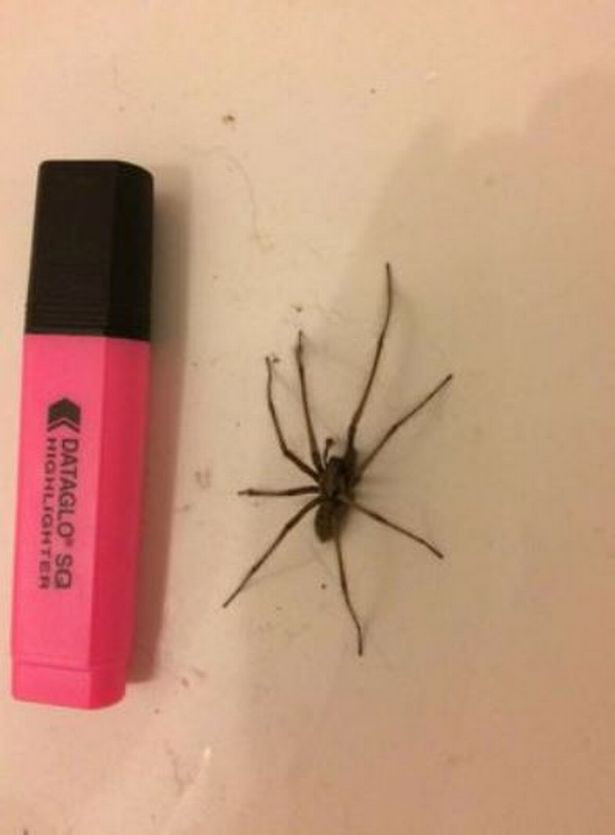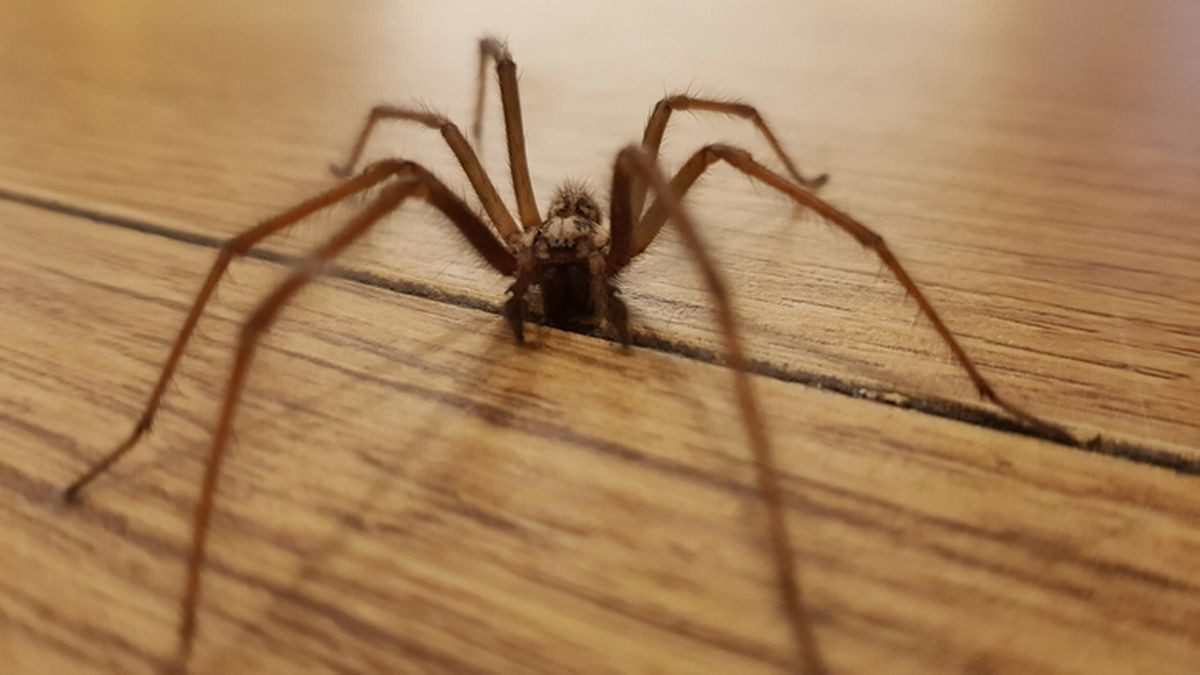It's officially the season many dread: spider season is upon us. This marks the time when curious arachnids begin to invade homes, turning peaceful evenings upside down.
From late August and peaking through September, spider sightings become prevalent, especially with males searching for mates. Their roaming behavior often leads them to scurry across floors or appear unexpectedly, causing many to cringe.
With this influx, individuals seeking to manage spider invasions might be interested to know about some effective deterrents. One simple home remedy suggested is the use of white vinegar on windowsills.
According to Rentokil, spiders can squeeze through the tiniest gaps—yes, even those you might not think of, like skirting boards or window frames. This is why white vinegar, when sprayed liberally on areas where spiders might enter, can be beneficial.
But why is vinegar such a good repellent? The strong acidic aroma is something spiders find unappealing, making it easier for homeowners to keep these critters at bay.
Yet, experts like Rentokil remind us this is just one component of effective spider management. Ensuring all cracks and crevices are sealed with caulk, for example, is also important to prevent spiders from entering your abode.
For those particularly squeamish about spiders, the strategy can take it up another notch by removing webs regularly. This not only helps to minimize their habitat but also sends spiders the message it's not such a great place to set up shop.
Rentokil advises against killing spiders indiscriminately, emphasizing their ecological importance—trap flies and other pesky insects.
Interestingly, there's more to help control spider populations beyond vinegar. Strong scents, such as mint and citronella, can also function as natural deterrents.
If you have lavender thriving in your garden, it's time to put it to use! Sprinkling fresh lavender around entry points will not only beautify your space but keep spiders away as well.
An extra solution is drawing chalk lines around the perimeter of your doors and windows. Spiders are known to dislike chalk's taste and will avoid crossing it.
Spiders are notorious for their phobia-inducing presence; yet fighting back with strategic preventive measures can ease concerns. So, as the days get shorter and these critters begin their annual ascent, keep your home spider-free with these handy tips.
By sealing cracks, using vinegar, and employing natural fragrances, homeowners can step up their spider prevention game. Remember, the goal isn't to wage war on arachnids but to coexist peacefully without living under siege!
Giant Spiders: A Comeback Story
British homes may become overrun with spiders this summer, as the creepy crawlies are set to invade properties across the UK during their breeding season.
Summer has arrived and Brits are flocking outdoors to soak up the long-awaited sunshine. But something more ominous might be sneaking into your home.
Spiders. Whether they're darting across your bed at night or hiding in room corners, these eerie creatures are now preparing for their mating season.
And what better place to do it than in the snug surroundings of your warm home? To add insult to injury, a beastly creature known as the 'fen raft spider' is making a comeback in the UK, thanks to a 'successful' breeding project, The Sun reports.
Astonishingly, these spiders are said to be the 'size of rats', with webs expanding to the size of pizzas. But don't fret.
Fen Raft Spiders: A Comeback Story
Yes, you read that right. This is a giant fish-gobbling spider that can, according to the British Arachnological Society, even skate around the water to catch prey.
Fen raft spiders are easily one of the largest and rarest species of arachnids in Britain.
Their body is 22mm (0.87 inches) long with a leg span of about 70mm (2.8 inches) – females are about the size of a human palm. So, if you spot on in your house, you might need more than a mug to trap it.
Despite this, these creepy crawly kaiju were on the brink of extinction until 2010 as their wetland homes were destroyed by humans, sucking the fens dry so the water could be used for public use.
They were listed as endangered on the UK Red List of species of extreme rarity in 1991, the Fen Raft Spider Conservation says, and are protected by law under the Wildlife and Countryside Act (1981).
But thanks to conservation efforts, fen raft spiders are thriving once more in Norfolk and Suffolk, Discover Wildlife reported.
There are thought to be 3,750 fen raft spiders skittering around the Strumpshaw Fen in Norfolk alone.
Conservationists increased the number of sustainable spider populations to 12 by digging up more suitable habitats for them and, well, moving them there.
In 2011, there were only three populations – Suffolk, East Sussex and Swansea.
Ask anyone with arachniphobia, and this might not be the news they wanted to read. For local wildlife, however, this is just what they’d been hoping for, Tim Strudwick, the RSPB Mid Yare nature reserves site manager, told Disoicver Wildlife.
‘The females are impressive in size, but also beautiful – they are truly special to see,’ he said, really stressing that fen raft spiders are completely harmless to humans.
‘The spiders are only seen in the grazing marsh ditches and are fairly shy but are easier to see from June to September.
‘Walking along the meadow trail gives visitors at Strumpshaw Fen the best chance of sightings of the mature females and their glistening nursery webs, so now is the perfect time to make a trip to the reserve.’
Those webs, by the way, stretch about 25cm across – about the size of a pizza.
Preventing Spider Invasions: A Guide for Homeowners
Spiders make their way into your home looking for a cosy spot to lay their eggs at this time of year. An expert has shared some top tips to help keep your home spider-free.
September is just around the corner marking the beginning of spider breeding season - the shift in temperature drives them indoors to find a warm spot for their eggs.
With this in mind John Stewart from Pelsis UK's technical team has offered his top five tips to keep your home arachnid-free.
- Seal off entry points
John advises: “Spiders often sneak into homes through gaps under doors and around windows. Ensuring window frames are properly sealed and excluder strips are fitted to the base of doors may help prevent entry.
“While it is unlikely you'll be able to seal off every single point of entry for a spider, ensuring the major ones, such as gaps under doors, are blocked will go a long way to keeping the critters out of your living space.”
- Use lemon-scented cleaners or DIY spray
The expert reveals that spiders are “strongly deterred” by citrus scents, suggesting the use of lemon-scented products on furniture, skirting boards, and windowsills to repel them. For a homemade solution, mix lemon juice with water and spritz around the house for similar results. It's recommended to start using these methods before spider season hits to prevent them from entering your home, reports the Express.
- Keep it clean
Regular cleaning might not be fool proof, but it can discourage spiders from settling in, especially if you're diligent about removing webs. Hoovering your house frequently can be crucial, not only will it help to get rid of spiders but also any eggs they might have dropped, nipping future problems in the bud.
Remember to give extra attention to those nooks and crannies or underneath furniture that's where these eight-legged freeloaders love to lurk.
- Traps and vacuums
One pest control expert recommended: “Humane traps and vacuums are effective tools for spider control. These methods allow you to catch and release spiders outside without harming (or touching) them.”
They added: “The spider vacuum is definitely the most effective way of dealing with spiders, allowing you to easily capture them in almost any space. It also has a built-in LED light which is perfect for spotting them in dark corners.”
- Minimise outdoor lighting use
The expert continued their advice saying: “While spiders themselves are not attracted to light sources, many of the insects they feed on are, which in turn draws them towards outdoor lighting.”
A Natural Deterrent: Peppermint Oil
Experts at Magnet Trade think they have a straightforward solution to keep these eight-legged horrors out of your home. While you might be thinking of potent spider repellents or insecticides, that's not the case.
Surprisingly, you can purchase one natural spider deterrent for just £1.95 at your local supermarket - and you might even have it at home already. Paul Strong, Store Operations Manager at Magnet Trade, explained: “Like all species, spiders need water and moisture to survive. From sinks and dishwashers to the warmth given off from appliances, it’s the kitchen and bathroom that create the perfect moist environment to draw them in.
“Although they are mostly harmless, we don’t want crawlers contaminating our food or creeping up on us in the bathroom [...] Using houseplants and natural tricks to do the work for you is not only cheaper, but the chemical-free method makes your home look and smell amazing.”
The unconventional 'spider repellent', priced in Sainsbury's at £1.95, is peppermint oil. Strong and his team suggest adding 20 drops of this to water in a spray bottle, then spraying it around the corners of your home.
It's believed that fragrant oils, such as peppermint and chestnuts, deter bugs due to their potent smells. Spiders use their legs to taste and smell their surroundings, so the strong scent of these oils can be quite overwhelming.
This was also concluded in academic research from 2018, though scientists believe it can depend on the type of spider. Meanwhile, lemon oil - cited as a repellent in more than a million Google hits - reportedly didn't work at all, with experts slamming it as a 'myth'.
It may sound like a no-brainer but keeping your house tidy can help a great deal too, according to Strong. He went on: “From kitchen cabinets to behind appliances, spiders hide in corners because they don’t like to be out in the open.
“Decluttering your home and keeping it organised will reduce the chance of a spider putting up a web. Cleaning away dust is also really important as it is small insects and food particles that attract spiders inside.
“Due to the dark and moist environment, spiders are big fans of old bottles and cans. Recycle them as quickly as possible before they move in. If you keep your recycling bin indoors, it might be a good idea to move it outside for the time being.”
You can buy peppermint oil for just £1.95 at Sainsbury's. However, it's worth noting that it isn't suitable to use around pets, as the oil is toxic to dogs and cats.
The Pinnacle Gazette: Your Source for Engaging News
THE PINNACLE GAZETTE, a platform established by Tree of Evolution LLC, is your premier source for the latest news across a diverse array of topics. Our website offers comprehensive coverage on science, technology, current events, art, and sports, ensuring that you stay informed and gain fresh perspectives.


















